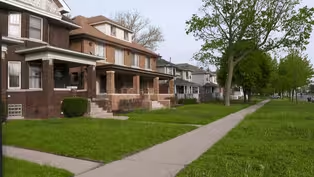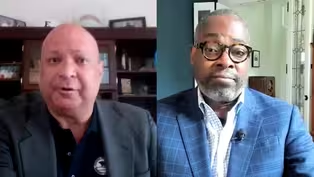
African American Cultural & Historical Museum’s new home
Clip: Season 52 Episode 40 | 8m 58sVideo has Closed Captions
The African American Cultural and Historical Museum secures a new home in Ann Arbor.
The African American Cultural and Historical Museum of Washtenaw County (AACHM) is preparing to move into a new permanent home in Ann Arbor with plans for a grand opening in November. Host Stephen Henderson talks with Dr. Debby Mitchell Covington, board chair of the African American Cultural & Historical Museum of Washtenaw County, about the new location and the museum’s exhibits.
Problems playing video? | Closed Captioning Feedback
Problems playing video? | Closed Captioning Feedback
American Black Journal is a local public television program presented by Detroit PBS

African American Cultural & Historical Museum’s new home
Clip: Season 52 Episode 40 | 8m 58sVideo has Closed Captions
The African American Cultural and Historical Museum of Washtenaw County (AACHM) is preparing to move into a new permanent home in Ann Arbor with plans for a grand opening in November. Host Stephen Henderson talks with Dr. Debby Mitchell Covington, board chair of the African American Cultural & Historical Museum of Washtenaw County, about the new location and the museum’s exhibits.
Problems playing video? | Closed Captioning Feedback
How to Watch American Black Journal
American Black Journal is available to stream on pbs.org and the free PBS App, available on iPhone, Apple TV, Android TV, Android smartphones, Amazon Fire TV, Amazon Fire Tablet, Roku, Samsung Smart TV, and Vizio.
Providing Support for PBS.org
Learn Moreabout PBS online sponsorship- Finally today, the African American Cultural and Historical Museum of Washtenaw County is finally going to get a permanent home.
The museum is gonna celebrate its grand opening at the Byrd Center Ann Arbor in November.
Founded 31 years ago, the museum has a collection of artifacts, photos, oral histories, documents, and other items that are donated from the African-American community.
Here's my conversation with the museum's Board Chair, Dr. Debby Mitchell Covington.
Tell me the story about this African-American History museum that is gonna open in Ann Arbor.
- Yes, so the museum started in 1993 and there was a gathering of the AKAs in Ann Arbor.
It's the Delta Psi Omega chapter of the Alpha Kappa Alpha sorority.
It was their Founder's Day in 1993.
And their guest speaker was Dr. Margaret Taylor-Burroughs, she was the keynote speaker.
And she challenged those in the audience to start an African-American museum in our community.
So she challenged those folks in the audience and they took the challenge, a few dedicated folks took on the challenge, and they started a museum right after that.
And since it started, the museum has presented over 100 programs and events and curated exhibits throughout the county.
And we've collaborated and partnered with several arts and culture institutions in the city and organizations.
We've had rich partnerships with the University of Michigan, several of the departments.
And we've also partnered with other arts organizations through Eastern Michigan University's Museum Studies Program as well.
- So give me an idea of the kinds of things that would make an African-American museum in Ann Arbor, for instance, different and special in a way that would distinguish it from the Wright Museum here in Detroit or the other African-American history museums around the country.
Tell me a little about that history in Washtenaw County.
- So the thing that makes our museum unique is that we really focus on local history.
So we have the community engaged in sharing their artifacts and things that they dig up in their basements or someone dies, and then we receive a bundle of programs from churches, church activities.
And we comb through that and piece together history.
And we started a Underground Railroad tour, and it's called The Journey to Freedom Underground Railroad Tour of Washtenaw County.
And it's officially registered with the US Parks National Underground Railroad Network to Freedom program.
And that happened in 2004.
So the tour covers 32 documented sites, buildings, and stories of three paths to freedom in Canada that run through Washtenaw County.
So because we're situated so close to Detroit, this was right along the path to the Underground Railroad.
Many people don't realize that a lot of the Black settlement in Ypsilanti in particular was people who ran away from slavery and self-emancipated and ended up in Ypsilanti.
You may be familiar with the fact that Elijah McCoy and his family lived here.
So there's rich history around that.
And the other thing that I found very interesting was, as we're talking in this age of diversity, equity, and inclusion, my high school grad, I'm a local resident, I grew up in Ann Arbor, and my high school reunion came about.
And some of my white school classmates were like, "We have been doing diversity in Ann Arbor for a long time."
They weren't aware that the Underground Railroad ran through Ann Arbor.
So those are some of the things that make it unique.
- Yeah.
So let's talk about this physical space, what that means to the museum and what people will experience.
- I love that question.
So for 28 years, we operated as a museum without walls.
And in 2021, we leased a space in Ann Arbor and we immediately began to look for a permanent home.
So we, in 2022, we purchased a 140-year-old farmhouse that was owned by Dr. David Byrd and his wife, Letitia Byrd.
And Letitia is one of the founding members of the museum.
And her desire was always that that building would be the permanent home for the museum.
So in 2022, we were able to purchase the building outright for cash.
So there's no overhead.
So that, you can imagine what that means, exactly.
And because we're a 501C3, it's a tax-exempt property.
So we are just really on great financial footing to be able to move forward.
And there's nothing like ownership.
There's nothing like ownership.
So this is a place that will be a gathering space for the community.
It will, I can envision Saturday morning chess games with young men and young women and older men and older women in the space playing chess.
And just passing on that generational wisdom.
It means that we can have all kinds of programming that we were limited by our other space.
So we have plenty of parking.
We're looking forward to the multiple types of exhibits that we will do.
Our opening exhibit is called "Holding Space for African-American History."
And we will, in each of our galleries, there will be a piece of the history of the museum and the people from the community and their lives.
So we're really excited about our November opening.
- Yeah, yeah.
So the idea of an African-American history museum in Ann Arbor is huge for African-Americans, but it seems to be that it's also important for the entire population to be able to experience and understand and learn about how important African-American presence is and has been in a place where not everybody thinks of that issue when they think about that place.
- You're absolutely correct.
And over the years, we have been able to build successful partnerships with other groups in the community.
And we have elevated Black history in the county.
So now when people think about, okay, what are we going to do in the old, what we call the old Black neighborhood, they stop and say, "Wait a minute, we can't do this without consulting the African-American Cultural and Historical Museum" because so many of the individuals that are in leadership positions now have gone on the Underground Railroad tours.
They toured our exhibits in the leased space.
And also, we offer tours and history lessons for students in the public schools.
So it definitely has impacted the larger majority.
And it's becoming more and more critical as we see the erosion of progress because of this anti-woke anti-DEI movement across the country.
So museums like ours become even more important to the African-American community, but also to the broader community.
Cost of housing ranks high among young voters ahead of 2024 election
Video has Closed Captions
Clip: S52 Ep40 | 3m 54s | Affordable housing is a top concern for young voters ahead of 2024 presidential election. (3m 54s)
Large corporations scaling back DEI efforts in the wake of backlash
Video has Closed Captions
Clip: S52 Ep40 | 11m 2s | Large corporations and companies are scaling back DEI efforts in the wake of backlash. (11m 2s)
Providing Support for PBS.org
Learn Moreabout PBS online sponsorship
- News and Public Affairs

Top journalists deliver compelling original analysis of the hour's headlines.

- News and Public Affairs

FRONTLINE is investigative journalism that questions, explains and changes our world.












Support for PBS provided by:
American Black Journal is a local public television program presented by Detroit PBS

